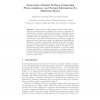Free Online Productivity Tools
i2Speak
i2Symbol
i2OCR
iTex2Img
iWeb2Print
iWeb2Shot
i2Type
iPdf2Split
iPdf2Merge
i2Bopomofo
i2Arabic
i2Style
i2Image
i2PDF
iLatex2Rtf
Sci2ools
ECCV
2010
Springer
2010
Springer
Anisotropic Minimal Surfaces Integrating Photoconsistency and Normal Information for Multiview Stereo
Abstract. In this work the weighted minimal surface model traditionally used in multiview stereo is revisited. We propose to generalize the classical photoconsistency-weighted minimal surface approach by means of an anisotropic metric which allows to integrate a specified surface orientation into the optimization process. In contrast to the conventional isotropic case, where all spatial directions are treated equally, the anisotropic metric adaptively weights the regularization along different directions so as to favor certain surface orientations over others. We show that the proposed generalization preserves all properties and globality guarantees of continuous convex relaxation methods. We make use of a recently introduced efficient primal-dual algorithm to solve the arising saddle point problem. In multiple experiments on real image sequences we demonstrate that the proposed anisotropic generalization allows to overcome oversmoothing of small-scale surface details, giving rise to...
Related Content
| Added | 12 Jul 2010 |
| Updated | 12 Jul 2010 |
| Type | Conference |
| Year | 2010 |
| Where | ECCV |
Comments (0)

